The Iliad (Penguin Classics) Read online
Page 18
‘Aphrodite daughter of Zeus, be off from the battlefield and its slaughter! Isn’t it enough for you to seduce the feeble wits of (350) women? If you persist in interfering in battle, I think you will be taught to tremble at the very mention of it, wherever you hear it.’
So he spoke, and Aphrodite withdrew, bewildered and in considerable discomfort. Her lovely skin was darkening with blood and she was hurting from the pain, but Iris, quick as the wind, took charge of her and led her out of the tumult. To the left of the battlefield Aphrodite found the wild War-god Ares, seated on the ground, with his spear and horses resting on a bank of cloud. Sinking to her knees, she entreated her brother for the loan of his horses with the golden headpieces:
‘See me safe, dear brother. Let me have your horses to get me (360) back to Olympus where the immortals have their home. I’m in agony. I’ve been stabbed by a mortal, Diomedes, who is in a mood now to fight with Father Zeus himself.’
APHRODITE etreats to Olympus
So she spoke, and Ares gave her the horses with the golden headpieces. Aphrodite mounted the chariot in some distress but Iris got in beside her, took the reins in her hands and lashed the horses with the whip to get them moving. The willing pair flew off; and before long they reached steep Olympus where the gods have their home. There swift Iris, quick as the wind, brought the horses to a halt, unyoked them from the chariot and threw (370) ambrosial fodder down beside them, while celestial Aphrodite went to her mother Dione and sank down at her knees. Dione took her daughter in her arms, stroked her with her hand and spoke to her:
‘My darling child, which of the Sky-gods has foolishly treated you like this, as if you had done something wicked in public?’
Laughter-loving Aphrodite replied:
‘The son of Tydeus, dauntless Diomedes, stabbed me because I was rescuing my own beloved son Aeneas from the battle – the son who means more to me than anyone! This war is no longer (380) a struggle between Trojans and Greeks: the Greeks are fighting now against the gods as well.’
Dione, celestial goddess, replied:
Dione on the gods’ suffering
’Endure, my child, and put up with it, despite your distress. Many of us that live here on Olympus have suffered at the hands of men in our attempts to inflict serious injury on one another.
‘Ares, for one, had to suffer when Otus and mighty Ephialtes, children of Aloeus, threw him in chains. He spent thirteen months trussed up in a bronze jar. And that would have been the end of the insatiable War-god Ares, if beautiful Eriboea his (390) stepmother had not told Hermes what they had done. Ares’ strength was already failing him when, despite the formidable shackles that held him, Hermes spirited him away.
‘Hera suffered too when Heracles mighty son of Amphitryon hit her in the right breast with a three-barbed arrow – she was in absolute agony.
‘And dread Hades had to suffer, like the rest, when that same Heracles, son of Zeus who drives the storm-cloud, shot him with a flying arrow at Hell’s gate among the dead and hurt him very badly. Sick at heart and in excruciating pain, Hades found (400) his way to high Olympus and Zeus’ palace. The arrow had driven into his shoulder muscles and was giving him considerable distress. However, Paeëon the healer spread pain-killing herbs on the wound and healed him; for, after all, he was immortal. But what a self-willed monster that Heracles was! He cared so little what wickedness he set his hand to that he harassed the very gods who live on Olympus with his bow!
‘As for your trouble, it was grey-eyed Athene who told the man to chase you. What a fool Diomedes is! He has no idea how short life is for the man who fights the immortals. For him, there is no homecoming from war and its horrors, no little (410) children gathering at his knee to call him ‘‘father’’. So let Diomedes, mighty man though he is, take care that no god more formidable than you comes out to fight him, or one day his wife noble Aegialea, wise daughter of Adrestus, will awaken the household she loves from sleep, bewailing the loss of her young husband, the best of the Greeks, horse-taming Diomedes.’
She spoke, and wiped the ichor from Aphrodite’s wrist with her hands. The wound healed and the severe pain was relieved.
Athene and Hera had missed nothing of this and turned (420) mockingly to Zeus. The goddess grey-eyed Athene began and spoke her mind:
The gods tease APHRODITE
‘Father Zeus, will you be offended by what I say? Aphrodite must have been at work again, luring Greek women into the arms of the Trojans whom she loves so vehemently. One of these lovely-robed Greek women was evidently wearing a gold brooch, and Aphrodite scratched her dainty hand on it as she patted her and egged her on.’
So she spoke, and the Father of men and gods smiled, called golden Aphrodite and said:
‘Warfare, my child, is not for you. You take charge of the (430) marriage-bed and its passions. Leave fleet-footed Ares and Athene to look after military matters.’
As they discussed this with one another, Diomedes, master of the battle-cry, flung himself once more at Aeneas. He knew that Apollo himself had taken him under his protection, but he had no respect even for that great god and persisted in his efforts to kill Aeneas and strip him of his impressive armour. Three times he flung himself at Aeneas, determined to kill him, and three times Apollo knocked his glittering shield aside. But when like something superhuman he charged for the fourth time, the Archer-god Apollo gave a terrible cry:
(440) ‘Think, Diomedes, and give way! Don’t aspire to be our equal! Immortal gods and men that walk on the ground are not the same breed.’
APOLLO warns Diomedes
So he spoke, and Diomedes fell back just a little to avoid the wrath of the Archer-god; and Apollo removed Aeneas from the battlefield to the holy citadel of Pergamus in Ilium where his temple stood. There, in the great inner shrine, Leto and Artemis who delights in arrows not only healed him but made him more splendid than ever.
Meanwhile Apollo, lord of the silver bow, created a phantom (450) which looked exactly like Aeneas, armour and all. Round this phantom, Trojans and Greeks hacked at each other from behind the oxhide shields, great and small, that protected their chests. Then Phoebus Apollo spoke to wild Ares:
‘Ares, murderous Ares, butcher of men and sacker of towns, won’t you take a hand and drive this man Diomedes out of the fighting? He’s in a mood to fight Father Zeus himself. He began by closing with Aphrodite and stabbing her in the wrist and then he flung himself, like something superhuman, at me.’
(460) With these words Apollo withdrew and sat down on the heights of Pergamus in the town, while Ares the destroyer disguised himself as Acamas, the swift leader of the Thracians, and slipped in among the Trojans to rally them. He began by giving instructions to the Olympian-bred sons of Priam:
ARES urges on the Trojans
‘Sons of Olympian-bred lord Priam, how much longer are you going to let your men be slaughtered by the Greeks? Till they are storming the town gates? Aeneas son of great-hearted Anchises lies low – a warrior we honour in the same breath as godlike Hector. Come on now, and rescue our brave comrade from the mayhem.’
(470) With these words he put fresh heart and courage into every man. Then Sarpedon rebuked godlike Hector.
Sarpedon abuses Hector; Aeneas returns
‘Hector, where is the spirit you used to show? You talked of holding the town without troops or allies, single-handed but for your brothers and brothers-in-law. But I look around and can’t see a single one. They are cowering like dogs before a lion, while we do the fighting, though we came in only as your allies.
‘Take me. It was a long, long journey I made to reinforce you. It is a far cry from Lycia and the eddying River Xanthus, where (480) I left my dear wife, baby son and great possessions too, which every poor man would love to get his hands on. Nevertheless, I make my Lycians fight and am myself as determined as ever to meet my man in battle, even though I own nothing here the Greeks could loot or carry off.
‘Meanwhile you just stand there, and don’
t even tell your men to make a stand or fight in defence of their women! Take care, or you’ll be caught like fish in a net and fall easy prey to your enemies, who will be sacking your prosperous town any day now. You can plead with the leaders of your allies, (490) but your priority day and night should be to make a determined stand yourself and give no one any grounds for harsh criticism.’
So spoke Sarpedon, and Hector was stung by his rebuke. Fully armed, he immediately leapt from his chariot to the ground and, brandishing a pair of sharp spears, went everywhere among his men, urging them to fight and rousing their spirit for grim battle. As a result the Trojans turned and faced the Greeks, but the Greeks held their ground in massed formation and did not retreat. As the wind carries the chaff across the sacred threshingfloor (500) when men are winnowing and, as the winds rise, the golden-haired goddess Demeter separates the grain from the chaff, and the heaps of chaff gradually whiten – so the Greeks were whitened from above by the dust which the horses’ hooves kicked up through the ranks into the bronze sky as their charioteers wheeled them round to rejoin them again; and the enemy were engaged full on at close quarters.
But now the wild War-god Ares, ranging everywhere, threw a veil of darkness over the battle to help the Trojans. He was carrying out the orders he had from Phoebus Apollo of the (510) golden sword. Phoebus had told him to put fresh heart into the Trojans when he saw Pallas Athene, who was on the Greeks’ side, withdraw. Moreover, Apollo himself made Aeneas leave the rich shrine where he had taken sanctuary and filled this shepherd of the people with new determination. So Aeneas took his place once more among his troops, who were delighted to find him still alive and see him come back sound of limb and fired with determination. Not that they had time to ask him any questions: there was far too much fighting to do, stirred up by Apollo, lord of the silver bow, man-slaying Ares, and implacably determined Strife.
(520) The Greeks on their side were spurred on to fight by the two Ajaxes, Odysseus and Diomedes. They needed little encouragement. No onslaught of the Trojan made them run for cover, however hard it was pressed home. They stood their ground like the motionless clouds with which Zeus caps the mountain peaks in calm weather, when sleep overcomes the powerful north wind and the other boisterous breezes that, with their shrill blasts, send the shadowy clouds scudding – so the Greeks held firm against the Trojans and refused to panic. Agamemnon went through their ranks, issuing orders:
‘Fellow warriors, be men. Keep your courage up and in the (530) heat of the battle fear nothing but dishonour in each other’s eyes. When warriors fear disgrace, more are saved than killed. There’s no honour or salvation to be found in flight.’
Agamemnon kills Deicoön
He spoke, made a swift throw with his spear and hit a leading fighter and companion of greathearted Aeneas, Deicoön son of Pergasus. Since he was always quick to fight among the front ranks, Trojans honoured him like one of lord Priam’s sons. Lord Agamemnon hit him on the shield. It failed to protect him. The bronze spear pierced it and drove on through the belt into his ab (540) domen. He thudded to the ground, and his armour clattered about him.
Aeneas replied by killing two of the best of the Greeks, Crethon and Orsilochus whose father Diocles lived in well-built Pherae. Diocles was a man of substance, tracing his descent from the god of the river Alpheus which flows at large through the region of Pylos. The River-god first bore Ortilochus, who ruled over many. He was father of great-hearted Diocles who in turn had these twin sons Crethon and Orsilochus, both experienced (550) in every kind of fighting. When they were of age, they embarked with the Greeks in their black ships for Troy to win compensation for Agamemnon and Menelaus. But there the adventure ended – in their death. As a pair of lions are brought up by their mother in deep forest thickets on mountain heights, and prey on cattle and fat sheep, and plunder farmers’ yards till they themselves fall victims to men with (560) bronze weapons – so these two were killed by Aeneas and fell, like tall pines.
Menelaus and Antilochus drive off Aeneas
Their death filled warlike Menelaus with pity. His bronze armour glittering, he advanced through the front ranks brandishing his spear. Ares spurred him on, intending him to be killed by Aeneas. But Antilochus, son of great-hearted Nestor, saw what Menelaus was doing and followed him through the front lines, fearing some disaster might overtake this shepherd of the people and bring all their efforts to nothing. Menelaus and Aeneas, both determined to fight it out, were already aiming their sharp spears (570) at one another as Antilochus came up to Menelaus and took his place beside him; and when Aeneas saw the two men making this united stand, he did not hold his ground, agile fighter though he was. So Menelaus and Antilochus dragged the bodies of Crethon and Orsilochus back into the Greek lines, and after handing over the luckless pair to their men, went back and fought in the front ranks once more.
Pylaemenesnd Mydon killed
Then they killed Pylaemenes, Ares’ equal, commander of the great-hearted shield-bearing Paphlagonians. He was standing stock still when the great spearman Menelaus stabbed him with his spear on (580) the collar bone. Meanwhile Antilochus hit his attendant and charioteer Mydon, who was wheeling his horses round. Antilochus hit him full on the elbow with a rock, and the reins, white with their ivory decoration, dropped from his hands and fell in the dust. Antilochus leapt in and drove his sword into the man’s temple. With a gasp, he fell headlong from the well-made chariot up to his head and shoulders in the dust. For a while he stuck there, since it happened to be deep at that point. Then his horses kicked him down and laid him flat on the ground. With a lash of the whip Antilochus drove the horses back into the Greek army.
Hector rallies the Trojans
(590) Across the ranks Hector had observed these two and now made towards them, shouting. He was supported by a powerful following of Trojans who were led on by the War-god Ares and the goddess Enyo. Enyo brought Confusion with her, the shameless destroyer, while Ares brandished in his hand an awe-inspiring spear and strode, now in front of Hector, now behind him.
When Diomedes, master of the battle-cry, saw them, he was shaken. Like a traveller crossing a great plain who halts helplessly beside a fast-flowing river rushing towards the sea, takes one look at the seething foam and turns back in his tracks, so (600) Diomedes drew back and said to his troops:
‘Men, no wonder we’ve been impressed by godlike Hector’s bravery and ability as a fighter: he always has one of the gods with him to save his skin. Ares is with him now, disguised as a man. Retreat then, but facing the enemy. We must not offer battle to the gods.’
So he spoke, and the Trojans were on them and Hector killed two men, Menesthes and Anchialus, neither lacking the will to fight, who were riding in one chariot.
Ajax kills Amphius
(610) Their death filled great Ajax son of Telamon with pity. Taking his stand close by them, he let fly with a glittering spear and hit Amphius, a rich man, who lived in Paesus and owned many cornfields. But destiny had brought him to Troy to serve as an ally of Priam and his sons. Ajax son of Telamon hit him on the belt. The long-shadowed spear stuck in his abdomen, and he thudded to the ground. But when glorious Ajax ran up to strip him of his armour, the Trojans met him with a volley of glittering spears, many of which he (620) took on the shield. Nevertheless, he planted his foot on the body and dragged his bronze spear out. But he could not remove the man’s own fine armour from his back – the spears were too much for him. Moreover, he was afraid of being surrounded and overpowered by the proud Trojans, who faced him in formidable numbers with their spears at the ready. So they forced him, great, powerful and noble though he was, to retreat. Shaken, he withdrew.
Sarpedon is wounded
So they battled it out in the thick of the action. Inexorable destiny then thrust Tlepolemus, the fine, tall son of Heracles, into conflict with godlike Sarpedon (630). When these two had come within range of each other, one a son, the other a grandson of Zeus who marshals the clouds, Tlepolemus was the first t
o speak:
‘Sarpedon, adviser to the Lycians, what made you come here, just to skulk and hide? You don’t know what a battle is. They are liars when they call you a son of Zeus who drives the storm-cloud: you are nothing like the sons he used to have. How different, by all accounts, from mighty Heracles, my all-daring, (640) lion-hearted father, who once came here to get Laomedon’s mares and, with only six ships and a pretty small force of men, sacked Ilium and widowed its streets. You have all the heart of a coward, and your troops are on their last legs. You may be a strong fighter yourself but I don’t think your journey here from Lycia will help the Trojans much. No, you’re going to fall to me and pass through the gates of Hades!’
Sarpedon, leader of the Lycians, spoke in reply:
‘Tlepolemus, Heracles did indeed sack sacred Ilium but only because of the stupidity of one man, noble Laomedon, who (650) repaid his services with insults and refused to let him have the mares he had come so far to get. As for you, I tell you dark death and destruction await you at my hands: conquered by my spear, you will surrender the glory to me and your life to the god Hades, famed for his horses.’
So spoke Sarpedon, and the other raised his ash spear. The great weapons leapt from their hands at one and the same time. Sarpedon hit Tlepolemus in the middle of the neck. The painful spear passed right through, and black night came down and (660) engulfed his eyes. At the same moment Tlepolemus’ spear hit Sarpedon in the left thigh. The point pressed eagerly on and grazed the bone; but, for the moment, his father Zeus saved him from death.

 The Odyssey
The Odyssey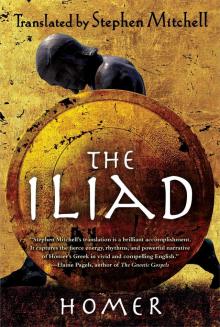 The Iliad
The Iliad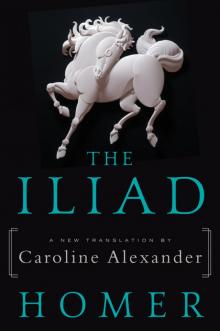 The Iliad (Trans. Caroline Alexander)
The Iliad (Trans. Caroline Alexander)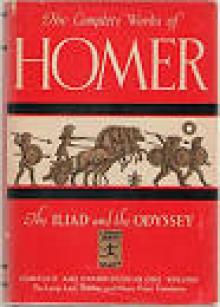 Complete Works of Homer
Complete Works of Homer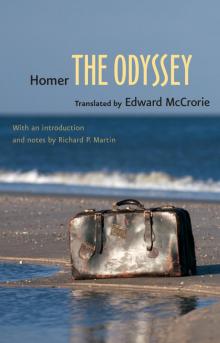 The <I>Odyssey</I>
The <I>Odyssey</I>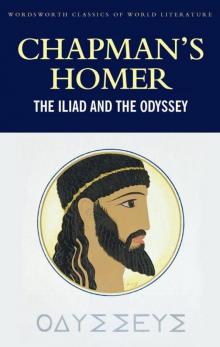 The Iliad and the Odyssey (Classics of World Literature)
The Iliad and the Odyssey (Classics of World Literature)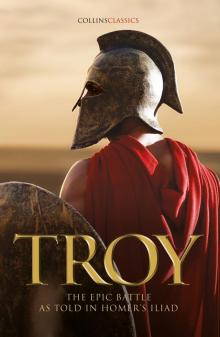 Troy
Troy The Iliad (Penguin Classics)
The Iliad (Penguin Classics)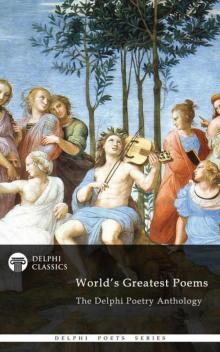 Delphi Poetry Anthology: The World's Greatest Poems (Delphi Poets Series Book 50)
Delphi Poetry Anthology: The World's Greatest Poems (Delphi Poets Series Book 50)